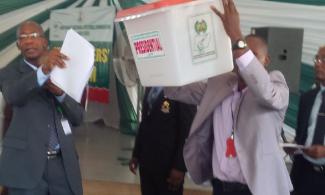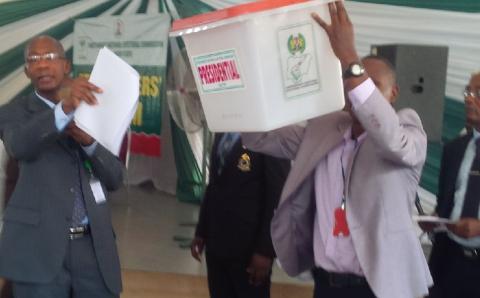
If elections are the essential ingredient in representative democracy, then presumably there should be some apparent connection between the will of the people as expressed through elections and the policies they receive from subsequently invested government (Downs, 2011).
Political parties adopt policies in order to win elections rather than win elections in order to adopt policies (Downs, 1957).
While the ban on electioneering campaign has not been lifted by the Independent National Electoral Commission (INEC), the political atmosphere is already charged. With party primaries slated for August and general elections coming up early next year (ceteris paribus), political actors are already strategizing ahead of 2019. The big one came last week Monday when the President Muhammadu Buhari (PMB) officially declared his intention to seek re-election. While mixed reactions have trailed the president’s declaration, the quality of conversation among the electorate is rather appalling. Therefore, the task here is to examine PMB’s fidelity to his campaign promises in 2015 which endeared him to most Nigerians, and the import of retrospective voting in the 2019 general elections following his re-election bid.
Bearing in mind the critical areas the Goodluck government failed woefully, candidate Buhari and his party the All Progressives Congress (APC) exploited the grievance of the electorate by giving top billing to security, corruption, and the economy. In addition, there was also a bonus to the economy which was to equate N1.00 to $1.00. Without asking questions on concerning the how, these promises resonated with an obviously livid electorate who were already in the mood of change; hence the resultant surrendering of their will to another agent of the state – PMB. This action is consistent with the view expressed in the first prefatory note above. However, can we say with certitude that the policies Nigerians received from the government they invested in 2015 correspond with their expectation thus far? A careful appraisal of the key issues candidate Buhari promised to tackle will answer this question.
SECURITY
While the movement of the Military Command to Maiduguri was a laudable effort which yielded commendable result, the very reason why it was moved appears to be defeated. If what we are seeing is anything to go by, the Haramists have been emboldened as evident in series of attacks they have launched since this year began. As if that is not enough, the murderous activities of the herdsmen is ever increasing with no respite in sight. Those who trooped out large number in 2015 to vote for this government to provide them with security in order to pursue happiness are now rewarded with a Hobbesian hypothetical state of nature. That the activities of the Haramists and murderous herdsmen persist only reminds us of what General Abacha once said about the persistence of such murderous acts. According to him, “if insurgency lasts more than 24 hours, the government has a hand in it”. Again, to think that voting billions of dollars into fighting insurgency would yield the desired result without addressing the root cause – poverty in absolute terms – to me is delusional. Were it to be so, the West would have won the war on terror long ago, having expended billions of dollars coupled with its military sophistication. Failure to address the economic dimension in a region that has the highest rate of poverty in Nigeria is what the Haramists are feeding on. This government has done little or nothing in this regard.
CORRUPTION
Nothing endeared the electorate in the 2015 to Buhari like his “supposed” anti-corruption credential. To paraphrase a market woman in Venezuela who saw the country’s liberation from the oligarchy in Hugo Chavez, most Buharists (this author inclusive) felt that democracy and governance were deeply infected, and Buhari was the only antibiotic that could heal them. Three years down the line, can those Buharists confidently voice those saint like platitudes about Buhari?
While the Buhari led government deserves some credit on the TSA and some other gains recorded so far in its fight against corruption, it goes without saying that its double standards on this issue has rubbished this feat. Up till now, no one has explained to Nigerians how Abdulrasheed Maina was smuggled back the federal civil service when it was public knowledge that he had serious corruption issue to answer. Other cases which involved Usman Yusuf of the National Health Insurance Scheme (NHIS), Mai Kanti Baru of the NNPC, Ahmed Abubakar of the NIA, and the Buratai property scandal in Dubai are serious issues that cannot be dismissed for a government that claims to be fighting corruption. In recent times, the PMB government also made a volte face on its tough talk on corruption by absolving those who renounce the People’s Democratic Party (PDP) and joined the APC. What the foregoing clearly says about this government is that we live in an Orwellian Animal Farm where some animals – Nigerians – are more equal than others (implicitly, others even have the license to kill). This readily brings to question the anti-corruption credential of the PMB government. The question now is: how different is this government from the one it replaced? As someone once said, it is clearly a case of “meet the new boss, same as the old one”.
ECONOMY
Not long after the PMB government assumed office, recession set in. This was blamed on the profligacy and financial recklessness of the GEJ administration and rightly so. Among the enlightened segment of the electorate, it was quite understandable that the rot inherited by the PMB’s government would make it difficult to get the economy back on track as he promised before the election. However, it was not expected that the economy would be detained in that condition as we have it today. The economic policy pursued by this government has no growth ingredient(s), or what the economists refer to as demand side policies. Economic policy disarticulation seems to be the hallmark of this administration as seen in the abysmal performance of the 2016-2018 Medium Term Expenditure Framework (MTEF) that was approved upon its assumption of office. This has impacted negatively on the lives of Nigerians, most of whom cannot afford the “necessaries and conveniences” of life arising from economic hardship which has given rise to crime rate.
While looted funds have been recovered in billions, with increased revenue accruing to federal coffers as a result of TSA implementation, revenue from FIRS and other non-revenue generating institutions like Immigration Service and FRSC in trillions, the country still suffers huge infrastructural deficit which has had consequences on economic growth. Instead of delivering the N1.00 to $1.00 exchange rate promised during election, a dollar now exchanges for N360.00 with serious negative multiplier effect on the economy, coupled with its bad forex policy in 2016 which served as a recipe for corruption, and consequently saw the naira crashing. Is this the change we voted for?
RETROSPECTIVE VOTING IN 2019
From the foregoing appraisal of Buhari’s presidency, we cannot say with certainty that there is correlation between the campaign promises in 2015 and the policy outcome in the past three years. This is consistent with the second prefatory note above. The way President Buhari has administered this country so far, it is obvious that he and the APC adopted those populist policies the sold to the electorate in 2015 to win election; not the other way round.
Since PMB has engaged in what political scientists call “moral hazard”, by which is meant reneging on the campaign promises that got him elected, there is a need for Nigerians to adopt the retrospective voting model in 2019, now that he is seeking re-election. The model thrives on reward and punishment after a careful assessment of the performance of incumbents who seek re-election. Having been deceived in 2015, applying the retrospective voting model on Buhari by subjecting his stewardship to further scrutiny is a task that we must do in order to make the right choice in 2019.
Speaking of the right choice, do we really have other options that we can choice from? Sowore, Durotoye, and Moghalu are young Nigerians – not of the establishment order – who have indicated their interest to put their names on the ballot. In order to avoid the “smoking mirrors” most Nigerians fell for in 2015 in the name of “change”, we have to start asking these aspirants serious questions concerning how they intend to accomplish their beautiful promises, plus, their public policy choices on sensitive national issues like economy, education, healthcare, justice system, youth empowerment, national integration, especially now that the country is so polarized and a lot more. Redirecting our campaigns on issues, as against frivolities will certainly do our ailing democracy a lot of good.
Ihembe, Martin is a Political Scientist with research interest in Political Development. He can be reached via 07036396194
